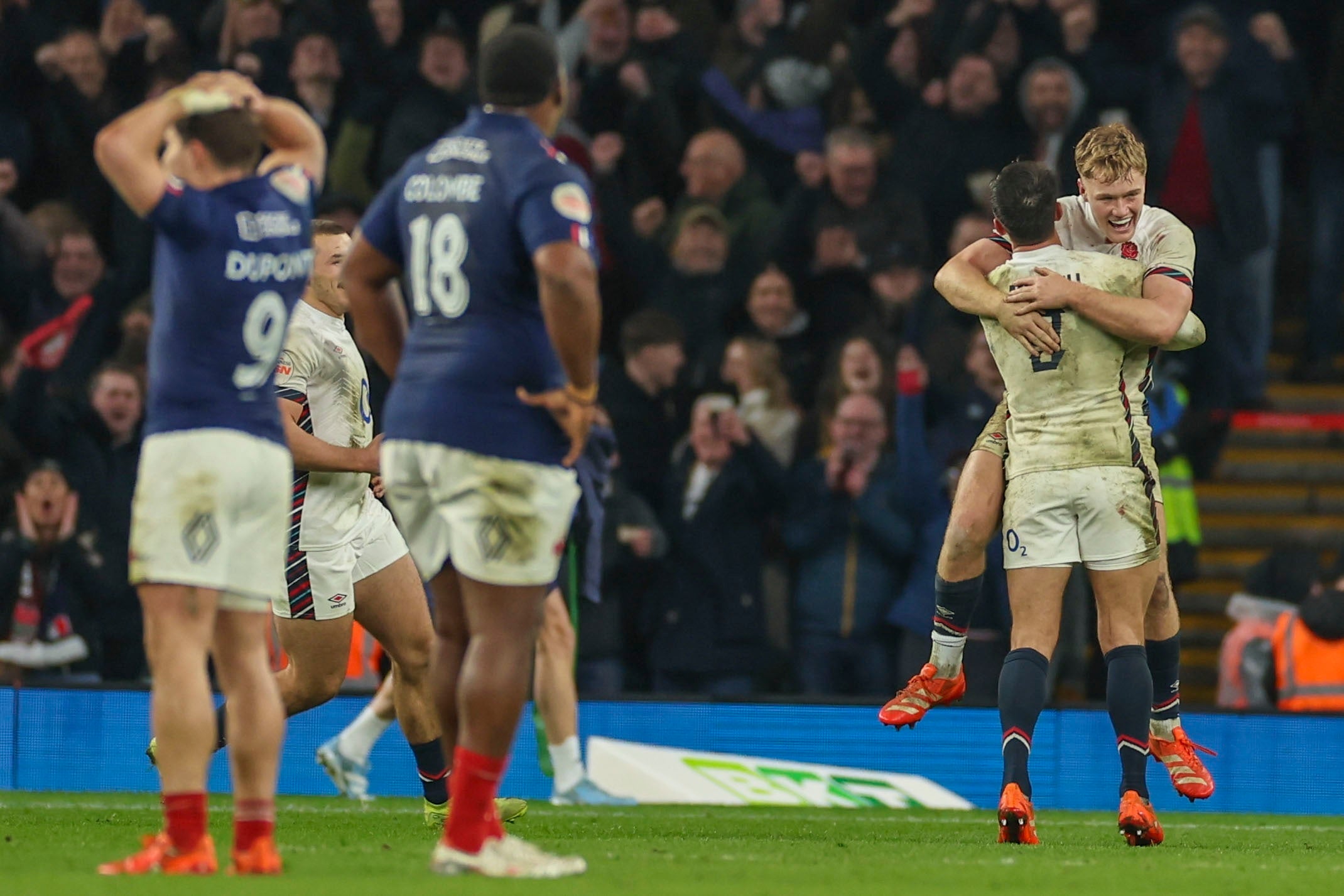On a day where the Smiths took centre stage, England’s charming men at last achieved the victory they have long sought. Seven times this likeable side had toiled to no avail against top-tier opposition over the last year, seven times coming close but not close enough. But no longer. This was a win that defied pre-match logic and, in truth, in-match flow, the full-time whistle greeted by an outpouring of emotion befitting a win of some magnitude.
One wonders how the Twickenham crowd will cope when they finally see a straightforward Six Nations contest. This was brilliant and baffling in just about equal measure, far from ideal conditions somehow managing to enrich rather than ruin what appeared a one-sided fixture on paper. An error-prone France appeared to have conjured enough magic to win the game thrice, only for England – yes, this England – to land an improbable knockout blow.
And so, Steve Borthwick’s side stay alive in this Six Nations. This is far from a result to cure all ills but in Fin Smith, Borthwick has surely found his fly half for present and future. Handed a first start here, in this fixture, the 22-year-old rose to the occasion, outshining the displaced Marcus Smith – scratchy at full-back – by a distance.

It was the Northampton playmaker who kicked the winning goal and gave the winning pass, Elliot Daly showing the expertise and excellence that comes with experience to arrive in a timely manner on his shoulder. Victory by a point; how England have had to wait to come out on the right side of a proper Twickenham thriller.
It had been a thoroughly miserable afternoon, the rain that tumbled of the kind to soak through an overgarment and sticky the shirt. The conditions dictated the contest, the handling errors, and skidding kicks, frequent as the two sides felt their way into the fixture.
The size of the French forwards proved an advantage with the going heavy. Through mud and mire, they trucked and trudged, winning the gainline more often than not to gain early close-in ascendancy. But the benefits of England’s tweaked defensive system were clear whenever the visitors attempted to go wider, tacklers not committing themselves and thus able to slide and scramble to prevent a cutting of the corners.
Much like Ireland in Dublin, France regularly felt close to breaking England open yet could not conclusively do so, their errors tending to come just as openings appeared. Such was the difficulty that a greasy ball was causing that visiting hooker Peato Mauvaka took to tossing a lineout underhand, while full-back Thomas Ramos tugged a simple penalty some distance wide of the left-hand post.
It took 20 minutes for England to mount an offensive, one that almost ended up costing them the first score. Having battered to within five metres, a sharp French jackal earned a penalty which the capricious Damian Penaud tapped with haste. A glorious flowing move followed and Ramos appeared to have added a golden touch with a neat toss to his left, only for Dupont to shell the try-scoring pass – even the greats are susceptible to a slippery ball. France, though, were beginning to really threaten: Penaud had eyes for the line as he moved through the gears; the ball, alas, was not safely stored in his saddle bag.
On half-an-hour, they at last found the required accuracy. There was a degree of fortune about the try’s origin – a contestable kick’s ricochet kind for a retreating French forward – but nothing lucky about its conclusion. Dupont scooped off his shoelace in stride with impossible ease before surging into space beyond Fin Smith. His inside ball to Penaud was smart and sharp; as was the wing’s kick ahead for Bordeaux Begles clubmate Louis Bielle-Biarrey, who showed off his scintillating speed to slide in the opener.
England had shown the absorbent qualities of a kitchen sponge for 30 minutes once again, but not really yet delivered on the attacking potential they hoped that pairing the Smiths would unlock. But with the end of the half drawing near, they produced some rugby to warm spirits and quicken the pulse. With a rotating cast dropping into the backfield to try and spark counter-attacks from France’s much talked about long kicking game, it was Henry Slade who got them going, spotting space on the right that Tommy Freeman and Alex Mitchell very nearly exploited.
Only a diving Jean-Baptiste Gros – the loosehead an unlikely saviour – prevented Mitchell grounding his own grubber. It proved only a temporary reprieve, though. From the resultant five-metre scrum, England drew penalty advantage and set to work. A bouncing ball caused havoc, and Ollie Lawrence burst out of the clutches of Ramos for an opportunistic levelling score.
Down the tunnel they departed to dry off and dust down, England asking familiar questions. After 40 minutes in which they had once again executed successfully a gameplan that frustrated and flustered the opposition, could they pivot to a strategy that would finally take them to a long-sought victory?
Certainly, it felt like a conclusive second-half surge from either side was unlikely to come given the difficulty each was having keeping hold of the ball. An inauspicious resumption saw Marcus Smith almost gift Bielle-Biarrey a second try by losing the ball in contact, – the Harlequin was grateful for Ollie Sleightholme’s sheer speed with the England wing about the only man in this championship able to stay with Bielle-Biarrey in full flight.
Ramos did, though, kick France back in front, making amends for his earlier miss. England, meanwhile, set their intentions by spurning a kickable penalty to instead plough for the corner – unwisely, it transpired, with a messy lineout and uninspired punching around the fringes causing France few problems.
The profligacy continued, though, a repeated dropping of the ball in space keeping England very much alive. Tom Willis had emptied the tank with an all-action performance, particularly defensively, that suggests a bright future at Test level, prompting Steve Borthwick to bring on Ben Curry. Another early arrival was loosehead Fin Baxter, whose scrum-time infringement allowed Ramos to collect another three from the tee.
The images felt familiar with England sliding away until two takes from Tommy Freeman changed the complexion. The wing’s aerial ability is not as talked about as that of some-time back three colleague Freddie Steward, but Freeman has statistically been the best in the Premiership under the high ball over the last couple of seasons. First, he claimed Fin Smith’s restart before the Northampton connection found joy with the crosskick: Saint to Saint, Smith to Freeman, England within one.
Briefly, at least. Off to work went Bielle-Biarrey and Penaud again, combining superbly. The Bordeaux pair have been as bold, beautiful and brilliant as any of the region’s reds this season, and were producing another performance of fine vintage.
The Marcus Smith full-back experience, by contrast, was leaving a bitter aftertaste. Though far from alone, the playmaker was erratic and error-prone on the counter-attack all evening, while a missed penalty followed the missed conversion to Freeman’s score.
Another Harlequin was, surprisingly, the individual to give England hope. Baxter bundled to the white line from close range; Fin Smith, taking over from the tee, kicked England in front.
Yet France had more magic in their hat; Dupont, the master, one more trick up his sleeve. Waving the wand inside his 22, what looked an aimless adventure proved the move to spark a match-winning try, finished by the brilliant Bielle-Biarrey. That could, should, have been that – but one last sharp Fin Smith pass sent Daly away and Twickenham into raptures.

